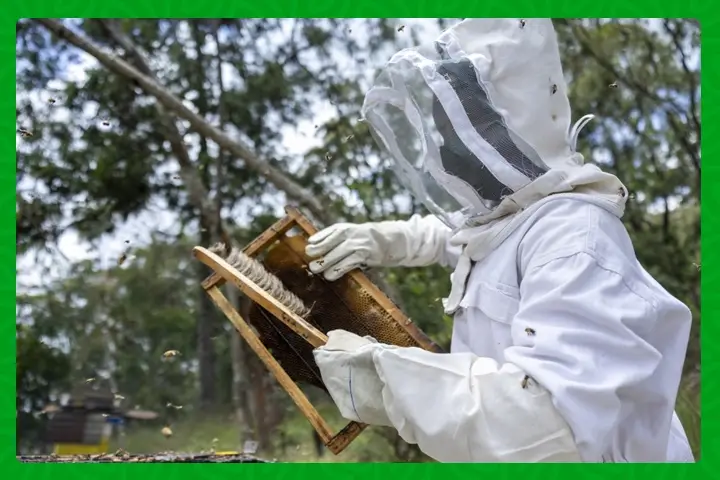
As Rwanda joined the global celebration of World Bee Day on May 20, experts sounded the alarm on a potential decline in food production due to the mounting threats facing bees, the world’s primary pollinators. Deforestation and pesticide use emerged as significant dangers, emphasizing the critical need for immediate action.
The Importance of Bees and World Bee Day
World Bee Day aims to raise awareness about the indispensable role pollinators play, the challenges they encounter, and their contributions to sustainable development. This year’s theme, “Bee Engaged with Youth,” highlighted the essential role young people can play in addressing the issues facing bees and other pollinators.
The Plight of Rwandan Beekeepers
Jean de Dieu Kwizera, founder of Beegulf Ltd, shared his struggle after being forced to relocate his business to Gisagara District. His initial site in Gasabo District, which housed 50 modern beehives and 30 traditional beehives, was deforested, significantly impacting his production.
“Deforestation and chemical use are major threats to the bee population,” Kwizera explained. “I had to move 50 modern beehives and 30 traditional beehives due to these threats. The maximum production per one modern beehive was 30 kilograms, and the minimum was 15 kilograms.”
According to Rwanda’s beekeepers’ federation, honey production has plummeted from over 6,000 tonnes to just 2,000 tonnes annually, far short of the national demand of 17,000 tonnes. A study titled “Agroecology in Rwanda: Status, Opportunities, and Challenges” reported a dramatic drop in honey production in various districts, with one area experiencing a 90 percent decrease.
Agroecology: A Path to Sustainability
Experts advocate for agroecological farming practices as a solution to preserve bee populations. These methods include organic farming, biodynamic farming, and agroforestry, which avoid chemical fertilizers and enhance soil fertility through composting, integrating animals, cover cropping, and crop rotation.
“Biodiversity conservation agriculture and the use of organic manure instead of pesticides are key to saving pollinators,” Kwizera emphasized. Abbias Maniragaba, a green economy expert, concurred, noting that eco-friendly agricultural practices are essential to maintaining bee populations and preventing a decline in honey production.
The Global Context
The United Nations policy brief presented on March 20 underscored the vital role of pollinators, revealing that nearly 90 percent of wild flowering plant species and over 75 percent of food crops depend on animal pollination. Unfortunately, bees and other pollinators, such as butterflies, bats, and hummingbirds, are increasingly threatened by human activities.
Species extinction rates are now 100 to 1,000 times higher than normal due to human impacts. Nearly 35 percent of invertebrate pollinators, particularly bees and butterflies, and about 17 percent of vertebrate pollinators, like bats, face extinction globally. This alarming trend threatens nutritious crops like fruits, nuts, and vegetables, potentially leading to a reliance on staple crops such as rice, corn, and potatoes, and resulting in a less balanced diet.
Intensive farming practices, land-use change, mono-cropping, pesticide use, and climate change-induced higher temperatures are major threats to bee populations and the quality of the food we grow.
Rwanda’s Efforts to Revive Bee Populations
Despite these challenges, Rwandan beekeepers remain hopeful. The government is working to restore drought-degraded ecosystems by replanting 15 bee-forage tree species. In collaboration with the International Union for Conservation of Nature (IUCN), the project aims to plant 25,000 bee-forage trees of diverse species on at least 200 hectares in the Eastern Province.
Steps to Support Bee Populations
The United Nations recommends several measures to support bee populations:
- Plant diverse native plants that flower at different times of the year.
- Purchase products from sustainable agricultural practices.
- Avoid pesticides, fungicides, or herbicides in gardens.
- Protect wild bee colonies.
- Sustain forest ecosystems.
- Diversify crops.
In conclusion, as the threats to bees continue to grow, it is imperative that we take immediate and concerted action to protect these essential pollinators. By adopting sustainable agricultural practices, supporting biodiversity, and engaging youth in conservation efforts, we can help secure a future where bees thrive and food production remains robust.
Original Article was written by Michel Nkurunziza
Stay updated with the latest farming tips and agriculture industry news from Africa by subscribing to our newsletter. Don’t miss out on valuable insights and updates. Follow us on Twitter, LinkedIn, and Facebook to join our farming community and stay connected with us.



















